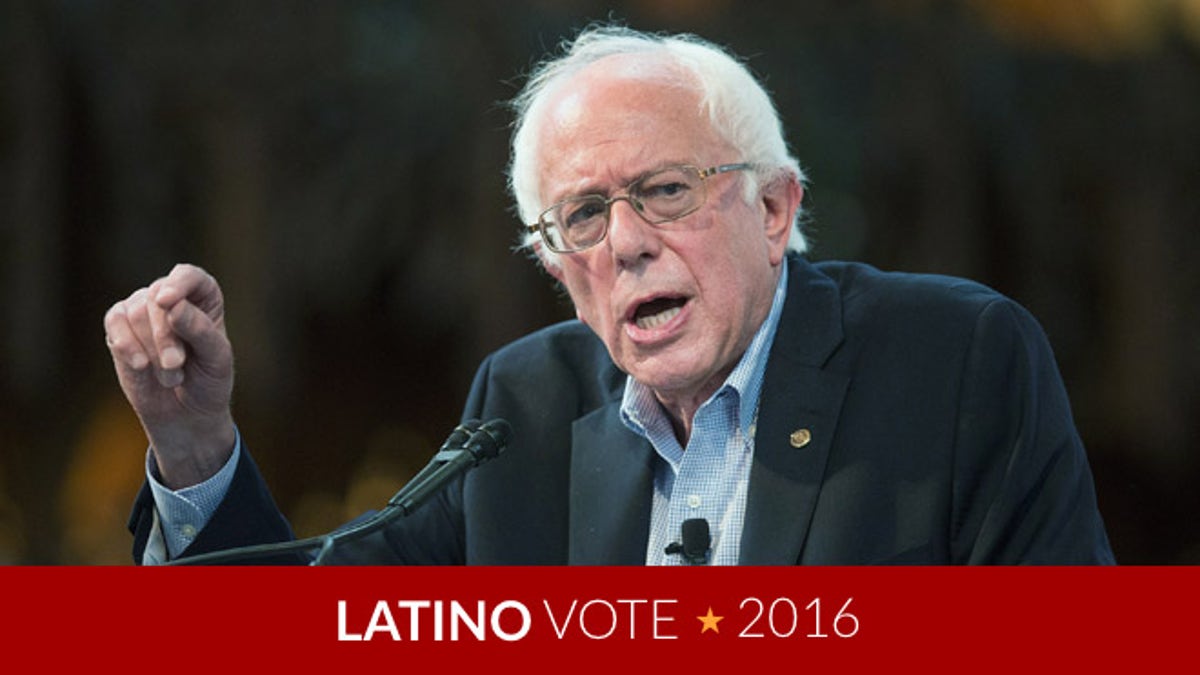
Democratic presidential candidate Bernie Sanders has received a good deal of positive news recently: his campaign netted $26 million in the last quarter without the help of any political action committees, he has closed the once enormous gap between him and front-runner Hillary Clinton to a manageable 16 points, and media coverage has shifted from painting the Vermont senator as a fringe candidate to one who is a serious contender for the Democratic presidential nod.
But it hasn't been all been sunny days in the Sanders camp, especially when it comes to the his appeal among the critical Latino electorate.
While Sanders may be drawing huge crowds of white progressives to his rallies across the country and is polling strongly in his home region of New England, the veteran lawmaker is either a virtual unknown to many Hispanic voters or is failing to win over the demographic from his rival Clinton.
An NBC News/Wall Street Journal/Telemundo poll released last month found that Clinton was viewed favorably by 53 percent of Latino voters, while only 30 percent viewed Sanders favorably.
"He doesn't have the connection with the community that Hillary Clinton does," Joe Trippi, a longtime Democratic strategist who managed Howard Dean's 2004 presidential campaign, told Fox News Latino. "There isn't any way that Sanders can get the nomination with the problems he's having expanding beyond white progressives."
To their credit, Sanders and his staff have acknowledged that the senator is not a household name among Latinos the way that Clinton is and are now attempting to use their $26 million war chest to get Hispanics to "feel the Bern."
Sen. Sanders doesn't have the name ID with Latinos that Clinton does, but we see that as a good thing.
"Let me be very honest with you. I come from a state, the state of Vermont, [and] it's a small state; there aren't a lot of Latino people," Sanders said earlier this week, according to the Huffington Post.
He added: "What we are trying very, very hard to do – you are going to see us moving very aggressively in that area – is introduce myself to the Latino community … I will fight for every vote I can get in the Latino community."
His campaign has depicted the longtime senator as an outsider to Washington politics – despite being in Congress since 1991 – and as a lawmaker that is more to the left in terms of immigration reform.
Sanders supports policies for boosting the quality of life of undocumented workers, has proposed an expansion of the Obama administration's executive action on immigration that permits young people brought to the country illegally to remain in the country, and has criticized the tough border enforcement provisions written into the immigration reform legislation passed in 2013 by the Senate.
The Democratic candidate has also played up his own family's immigrant story in an effort to connect with voters, talking about the members of his family who died in the Holocaust and how his parents worked hard to put him through college.
"I know something about immigration," Sanders said, according to the Los Angeles Times. "My dad came to this country from Poland at the age of 17 without a nickel in his pocket, without much of an education."
In terms of his campaigning among Latinos, Sanders' staffers say that the senator's lack of name recognition among the Hispanic electorate is actually a positive as they can sculpt his image and introduce a candidate that appeals to the demographic.
"Sen. Sanders doesn't have the name ID with Latinos that Clinton does, but we see that as a good thing," Arturo Carmona, the newly appointed Latino outreach coordinator for the Sanders' campaign, told FNL. "Our resources are now being used to invest in grassroots mobilization efforts. We're putting together a very aggressive program right now."
The Democratic primary may be nine months away – giving Sanders plenty of time to introduce himself to the community – but the self-described democratic socialist has a long way to go if he plans to win away even a fraction of the Latino voters committed to Clinton.
The former secretary of state, who had almost 2 to 1 support among Hispanics over Barack Obama during the 2008 primary campaign – has built a strong network with ties to Latino leaders on Capitol Hill, in labor unions and throughout communities across the U.S.
While Sanders recently earned the endorsement of Arizona Rep. Raul Grijalva, experts say that it will take a lot more than that for the Vermont senator to get some relief from his Latino problem.
Some say it will take Vice President Joe Biden entering the race. Biden might steal away some of Sanders' base support among blue collar workers, but the vice president could also help Sanders by dividing who Latino voters support even more.
"Sanders should be leading the 'run, Joe, run' campaign because that can solve his Latino problem, by having Biden steal away some Latino voters from Clinton and thus break up the Latino vote," Trippi said.
Staffers for Sanders, however, say they aren't thinking about the speculation about Biden running, but instead are concentrating on winning over Latino voters the same way they've won over their current supporters.
"At this point we're not focused on other candidates," Carmona said. "We're focused on building grassroots movements in communities across the country."





















